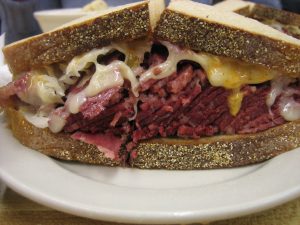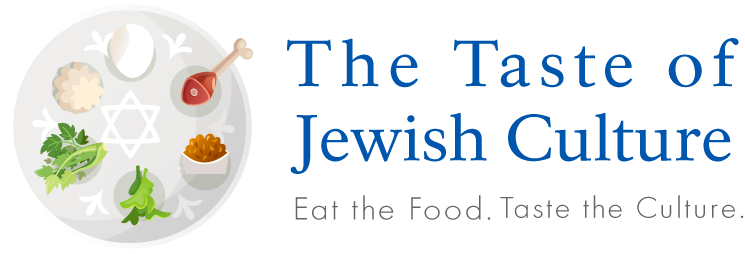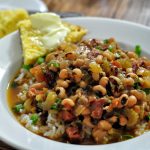Anyone who has been following this blog even slightly since its launch, over the last month or so, knows I use the term “Jewish Food” a lot. And if you’ve heard any of my Food Talks over the past few years, or read the “About this Site” page, you know some of my thoughts on the concept. But a recent video I watched raised an interesting point for me, so I want to write this post to explore the topic, and hopefully get some feedback from you, my readers.
While some people question the term, or even declare that “there is no such thing as Jewish Food,” I strongly disagree. For starters, I don’t believe that a food needs to be universally eaten by all Jews to qualify. I also don’t think it needs to be uniquely Jewish, without non-Jews eating it. Though I would argue that a food like matzah — and thus also its many derivative dishes like matzah brei, matzah balls, etc. — meets both of these criteria, thus arguably making it the most Jewish food.

I use three criteria (elaborated in that About page) for calling a food Jewish. To me, any food that is either uniquely Jewish, has been altered by Jews from the non-Jewish version (often for Kashrut purposes), or is very widely associated with Jews can, in my mind, be classified as a Jewish Food. So the bagels featured at top, for example, certainly meet the third criterion, and (as I may explain in a future post) probably the second as well.
But I take this discussion a drop further sometimes. Whenever I give my culinary tasting tours of Machane Yehuda Market, I make a point while discussing bourekas. I explain how they are a genuinely Jewish Food (part of the trio of classic Sephardic “B-pastries” along with boyos and bulemas)(2)Sephardic Flavors, Joyce Goldstein, but primarily because they reflect the Jewish history of migration. A Jew inventing a certain food is not enough, in my view, to make it a Jewish Food. “If a Jew invented the ham-and-cheese sandwich,” I continue, “we couldn’t call it a Jewish Food.”

But then, earlier this week, I was “attending” the first week of YIVO’s (very well done) new online course about Ashkenazi Jewish Food, “A Seat at the Table: A Journey into Jewish Food.” (By the way, the course is free, so you should definitely check it out!)
In the final Round Table discussion video, Jonathan Brumberg-Kraus of Wheaton College opined that essentially you can make anything a Jewish Food, by eating it for Jewish reasons. He suggested that if you opened a Brooklyn restaurant named “Treif,” and people ate there consciously in order to violate the laws of kashrut, whatever you served there would become Jewish!
So while I had long argued against the overly narrow view that eliminates the very concept of Jewish Food, here comes a claim from the opposite side of the spectrum. Anything, to Brumberg-Kraus, could be a Jewish Food. (By the way, that doesn’t mean that everything is already included, just that it has the potential to be.)
And while I am not sure I’d go as far as he would, perhaps there is something to his claim.
It reminded me of Anna Shternshis’ interesting article “Salo on Challah: Soviet Jews’ Experience of Food in the 1920s-1950s.”(3)in Jews and Their Foodways, ed. by Anat Helman She mentioned a Yiddish-speaker she came across in her research “who believed that the pork chops that she prepared with onions and garlic were kosher because she cooked them with a pinch of her Jewish soul (shtikl yidisher neshome).” Another interviewee told her, “My father had a special butcher, a shoykhet [ritual slaughterer]… who slaughtered pigs especially for Jews. He made kosher pork.”
Maybe anything does have the ability to become a Jewish Food under the proper circumstances. I’d love to hear… What do you think makes a food Jewish?
Footnotes
| ↑1 | The Book of Jewish Food, Claudia Roden |
|---|---|
| ↑2 | Sephardic Flavors, Joyce Goldstein |
| ↑3 | in Jews and Their Foodways, ed. by Anat Helman |







Faith Kramer
Well thought out. As a Jewish food writer I feel any recipe I create that I label Jewish must at least respect mainstream kashrut laws to make it accessible to as many Jews and Jewish traditions as possible but I do recognize the complicated relationship we Jews have with the “other” —trayef, especially since the overwhelming majority of Jews in America do not keep kosher, although many have made very personal compromises on what they will or will not eat and where they will eat what.
FunJoel
Thanks for the reply, Faith!
I hear your point. So then what do we do with, for example, all of the explicitly American Jewish cookbooks from the late 1800s and early 1900s that included completely non-kosher dishes, sometimes even treif versions of classic Jewish foods?
Do we simply write them off as being non-Jewish dishes presented in a Jewish context? Non-traditional versions of genuinely Jewish foods? Outliers that never became mainstream enough to reach the point of being considered “Jewish?”
The Unknown Jewish History of Bourekas - The Taste of Jewish Culture
[…] (or burekas or borekas or however you choose to spell them) are actually a true Jewish Food, as I mentioned in this post, and not only because we invented them. I don’t believe that is enough of a reason to […]